Manganese Benefits: 12 Essential Health Perks You Need
A deeper look at the vital role this essential mineral plays in your overall well-being.
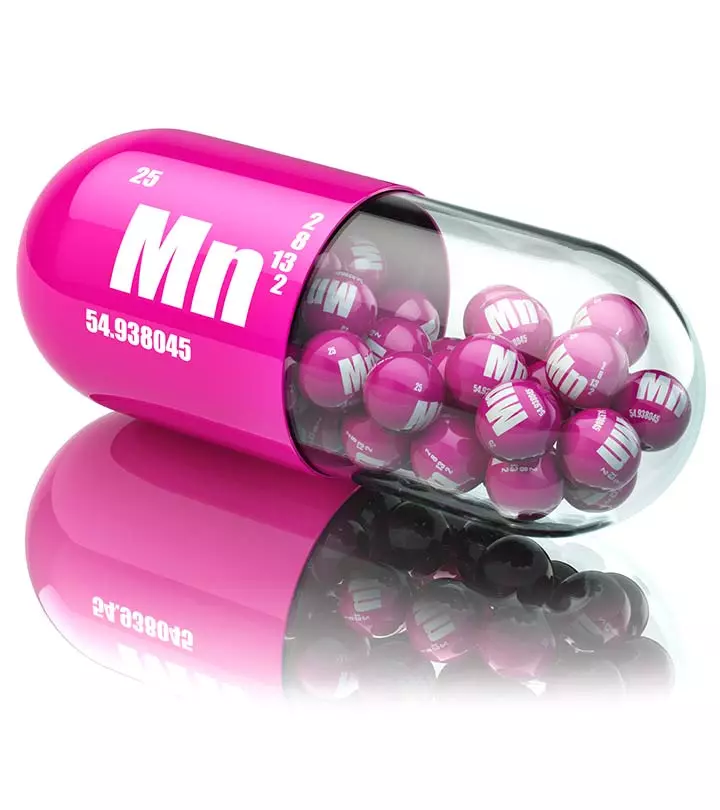
Image: ShutterStock
Manganese is one of the major trace elements required by the body. As the name suggests, it is only required in minute amounts. Manganese benefits you in multiple ways. It plays a vital role in the proper functioning of the nervous system. The human body approximately has 20 mg of manganese, which is majorly concentrated in bones, pancreas, liver, and kidneys.
Learn more about this mineral and the array of benefits it offers. Read on.
In This Article
Manganese – A Brief
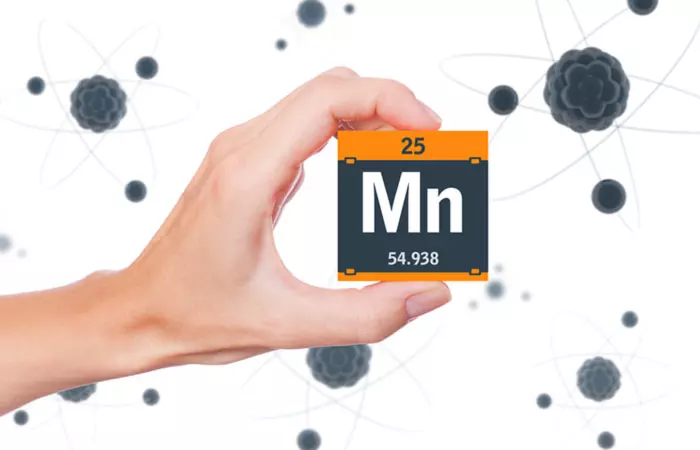
Manganese, an active component of the enzyme manganese superoxide dismutase, is necessary for the proper functioning of enzymes, absorption of nutrients, wound healing, and development of bones in the body. The deficiency of manganese may cause joint pains, poor bone health, and fertility problems. Studies have shown that one needs to take almost 12 mg of manganese on a daily basis for optimum health.
This trace mineral is a strong antioxidant that scavenges free radicals in the body.
Now, the important question that arises is, what are the sources of manganese? This trace mineral is found in variable quantities in spices, herbs, cloves, saffron, wheat germ, bran, nuts, mussels, oysters, clams, cocoa powder, dark chocolate, roasted pumpkin, squash seeds, flax, sesame seeds, sesame butter, chili powder, roasted soybeans, and sunflower seeds.
Key Takeaways
- Manganese is required for enzyme function, nutrient absorption, wound healing, and bone development in the body.
- Manganese deficiency can cause joint pains, fertility problems and poor bone health.
- It is good for brain health and helps regulate sugar levels, metabolism rate, treat inflammation and sprains, protect the body against oxidative damage and alleviate pms syndrome.
- However, excess intake of this mineral can lead to a number of fatal disorders like Parkinson’s.
How Manganese Is Beneficial
- Strengthens Bones
- Scavenges Free Radicals
- Controls Sugar Levels
- Treats Epilepsy
- Controls Metabolism Rate
- Treats Inflammation And Sprains
- Prevents Osteoporosis
- Good For Thyroid Health
- Alleviates PMS Syndrome
- Aids Vitamin Absorption
- Good For Brain Health
- Increases Energy And Functional Efficiency In The Body
Health Benefits Of Manganese: Why This Mineral Is Essential?
Let’s take a look at the spectrum of health benefits manganese has to offer.
1. Strengthens Bones

Manganese is vital for the normal development of the human bone structure (1). It helps to boost the mineral density of the spine (2). It has also proved to be beneficial for post-menopausal women. Manganese deficiency in women after menopause can increase the amount of trace minerals and cause minor fractures. Research is going on to establish concrete evidence that manganese may help prevent osteoporosis and many other diseases.
2. Scavenges Free Radicals
Manganese has antioxidant properties, which help it to monitor the activity of free radicals in our body (3). These free radicals can damage human cells and lead to cancer and other harmful diseases. Hence, it is vital to add manganese-rich food sources or supplements to your diet to avert the risk of inflammatory diseases.
3. Controls Sugar Levels

Manganese can aid in blood sugar regulation and help prevent diabetes. Manganese can normalize the synthesis and secretion of insulin in the blood to control the level of sugar. This also helps to regulate unpredictable drops in the blood sugar, which makes life easier for diabetics (4).
4. Treats Epilepsy
Epilepsy is a troublesome disorder, and the deficiency of manganese can trigger epileptic seizures. Manganese can act as a vasodilator and plays a key in treating seizures due to its anti-epileptic qualities (5). Manganese supplements may control minor and major epileptic seizures.
5. Controls Metabolism Rate
Regulating our body’s metabolism is an essential function of manganese.
Manganese-activated enzymes are useful to metabolize cholesterol, amino acids, carbohydrates, and vitamins such as vitamin E and vitamin B1. It also helps in proper functioning of the liver. Manganese can help in the metabolism of glutamine (amino acid) and is an integral part of DNA polymerase (6).
6. Treats Inflammation And Sprains

Manganese enhances the healing of sprains and inflammation by increasing the superoxide dismutase level (7). This happens due to its antioxidant properties. Superoxide dismutase (SOD) deficiency is also observed in patients with arthritis. SOD has anti-inflammatory properties that can alleviate arthritis. Manganese can help to increase the synthesis and functioning of SOD, thus helping reduce the symptoms of the condition.
 Did You Know?
Did You Know?7. Prevents Osteoporosis
Manganese supplements can give you relief from osteoporosis and osteoarthritisi A form of arthritis that develops as the pliable tissues at the ends of bones age and wear down. since this essential mineral can add to the bone density and mineral density. With all minerals, balance is key and not only supplementing with one mineral. However, further research is needed to specifically explore the impact of manganese on bone health (8).
8. Good For Thyroid Health
You may not be aware of many other mineral supplements for thyroid disorder other than iodine, right? But, manganese is also very much essential for thyroid health.
Manganese is an essential cofactor for enzyme activation for enzymes like thyroxine, a vital hormone in the thyroid gland. It is important to maintain proper functioning of the thyroid gland to avoid health issues. This can be useful to maintain proper appetite, metabolism, weight, and organ system efficiency (9).
9. Alleviates PMS Syndrome

Many women can suffer from premenstrual syndrome (PMS). Manganese helps to manage mood swings and reduce headaches, depression, and irritability. Women who suffer from severe PMS symptoms are advised to consume manganese supplements (10).
10. Aids Vitamin Absorption
Manganese can be useful in the absorption of essential vitamins such as vitamin B, vitamin E, and minerals. It plays an important role in enzymatic reactions required for the absorption and utilization of vitamins obtained from food (11).
11. Good For Brain Health
Manganese is found to be an essential component in treating many nervous system disorders and improving brain function. This property of manganese is due to the availability of superoxide dismutase, which scavenges free radicals from the neural pathways. Manganese also binds with neurotransmitters, thus regulating the transmission of electrical impulses throughout the body and enhancing cognitive function (12).
12. Increases Energy And Functional Efficiency In The Body
Manganese can also provide instant energy and ensure proper working of the body. It regulates glucose metabolism, thus ensuring proper energy distribution in each and every cell of the body. It also ensures proper absorption of glucose in the muscles and organs (13).
A Word Of Caution
Though manganese offers a lot of health benefits, you need to limit its consumption and be aware of its side effects. Listed below are a few things you need to keep in mind:
- Make sure you consume the amount prescribed by your healthcare provider. Overdose can be fatal.
- There are no reports of manganese toxicity due to high dietary intake. However, if it occurs, it may affect the central nervous system and include symptoms like tremors, hearing loss, muscle spasms, delusions, mood changes, short-term memory, reduced hand-eye coordination, etc. (14).
- Do not consume manganese supplements within one to two hours of taking an antacid. Antacids are known to lower the absorption of manganese in the body.
- People who receive nutrition through IV should avoid consuming manganese supplements.
- Children under the age of five may be negatively affected if manganese is inhaled.
- Using manganese supplements with quinolone antibiotics can be fatal.
- Manganese makes up the trio of toxic trace minerals in the body, and their deficiency or overuse can cause serious damage. Make sure that you never inhale it over a long period as it may lead to a number of fatal disorders like Parkinson’s.
- Those with liver disorders should avoid taking manganese supplements as they can lead to tremors or mental disorders.
- People who have iron-deficiency anemia should avoid supplementation as the body absorbs manganese in excess, thus creating an imbalance.
 Trivia
TriviaPublic Health Recommendations
The dietary intakes recommended by the National Academy of Sciences for common masses are as follows.
Age/Life Stage
Adequate Intake (Per day)
0-6 months 0.003 mg 7-12 months 0.6 mg 1-3 years 1.2 mg 4-8 years 1.5 mg 9-13 years, female 9-13 years, male
1.6 mg 1.9 mg
14-18 years, female 14-18 years, male
1.6 mg 2.2 mg
19+ years, female 19+ years, male
1.8 mg 2.3 mg
Pregnant women 2.0 mg Lactating women 2.6 mg
It’s important to meet the daily recommendation of manganese to prevent any side effects that may arise from its deficiency. Learn more in the section below.
Manganese Deficiency Diseases
A manganese deficiency, though rare, may lead to various health issues due to its essential role in the body’s enzymatic processes. Most notably, a manganese deficiency may cause skeletal deformation due to bone demineralization. It may also contribute to impaired growth in children and reproductive problems like increased premenstrual pain and altered mood in women. Furthermore, it may also affect glucose and lipid metabolism, potentially worsening diabetes symptoms (14). Additionally, insufficient manganese intake has been linked to skin and hair problems and a weakened immune system. However, a severe manganese deficiency is uncommon and typically occurs in conjunction with other nutrient deficiencies. A balanced diet rich in fruits, vegetables, whole grains, and nuts may provide an adequate amount of manganese to prevent these conditions.
Infographic: How To Get Your Daily Dose Of Manganese Without Supplements
Manganese is a trace mineral that’s vital for proper bodily functions, but it’s kind of a tricky one. Have too much and it becomes toxic for your body. That’s why it’s risky to take manganese supplements unless under the supervision of a professional healthcare provider. However, you can always get it through dietary sources without much risk of overdose.
Check out this infographic for 10 easy and practical ways to incorporate manganese into your diet.
Some thing wrong with infographic shortcode. please verify shortcode syntax
Although your body needs manganese in small quantities, this trace mineral performs a wide range of functions in the body. From strengthening bones and reducing oxidative stress and the risk of osteoporosis to providing immune system support to helping control blood sugar levels and absorbing vitamins, the benefits of manganese are simply outstanding. So, consume foods high in manganese like spices, herbs, nuts, oysters, flax seeds, sesame seeds, chili powder, and dark chocolate to achieve the daily recommended intake of manganese. However, excess intake of this trace mineral can even lead to fatal complications. So, consult a doctor to know figure out the ideal intake and practice caution.
Frequently Asked Questions
Is manganese good for hair?
Yes, manganese is good for hair. It plays a vital role in the production of collagen. Collagen is crucial for maintaining healthy hair.
Does manganese lower blood pressure?
Yes, manganese may lower blood pressure. It exhibits an anti-oxidative function that helps in managing blood pressure.
How long does manganese stay in the body?
Manganese may stay in the body for approximately 24 hours.
Illustration: Effective Health Benefits Of Manganese & Its Side Effects

Image: Stable Diffusion/StyleCraze Design Team
Discover the incredible health benefits of manganese, the trace mineral. In this informative video, explore how this essential nutrient supports bone health, antioxidant defense, and energy production in the body.
References
Articles on StyleCraze are backed by verified information from peer-reviewed and academic research papers, reputed organizations, research institutions, and medical associations to ensure accuracy and relevance. Read our editorial policy to learn more.
- The role of nutrients in bone health from A to Z
https://pubmed.ncbi.nlm.nih.gov/17092827/ - Manganese supplementation improves mineral density of the spine and femur and serum osteocalcin in rats
https://pubmed.ncbi.nlm.nih.gov/18330520/ - Manganese complexes and the generation and scavenging of hydroxyl free radicals
https://pubmed.ncbi.nlm.nih.gov/2855733/ - Association of blood manganese level with diabetes and renal dysfunction: a cross-sectional study of the Korean general population
https://www.ncbi.nlm.nih.gov/pmc/articles/PMC3973834/ - Manganese and epilepsy: brain glutamine synthetase and liver arginase activities in genetically epilepsy prone and chronically seizured rats
https://pubmed.ncbi.nlm.nih.gov/8099325/ - Effects of manganese on carbohydrate metabolism and mitochondrial enzymes in rats
https://pubmed.ncbi.nlm.nih.gov/7136726/ - The role of manganese superoxide dismutase in inflammation defense
https://pubmed.ncbi.nlm.nih.gov/21977313/ - The role of trace minerals in osteoporosis
https://pubmed.ncbi.nlm.nih.gov/8409100/ - Effects of manganese on thyroid hormone homeostasis
https://www.ncbi.nlm.nih.gov/pmc/articles/PMC2067987/ - Dietary calcium and manganese effects on menstrual cycle symptoms
https://pubmed.ncbi.nlm.nih.gov/8498421/ - Dietary reference intakes for vitamin A, vitamin K, arsenic, boron, chromium, copper, iodine, iron, manganese, molybdenum, nickel, silicon, vanadium, and zinc.
https://www.ncbi.nlm.nih.gov/books/NBK222332/ - Manganese action in brain function
https://pubmed.ncbi.nlm.nih.gov/12505649/ - Effect of manganese deficiency on insulin binding, glucose transport and metabolism in rat adipocytes
https://pubmed.ncbi.nlm.nih.gov/2204694/ - Manganese
https://ods.od.nih.gov/factsheets/Manganese-HealthProfessional/
Read full bio of Julie Freeman
Read full bio of Tanya Choudhary
Read full bio of Arshiya Syeda
Read full bio of Moksha Gandhi









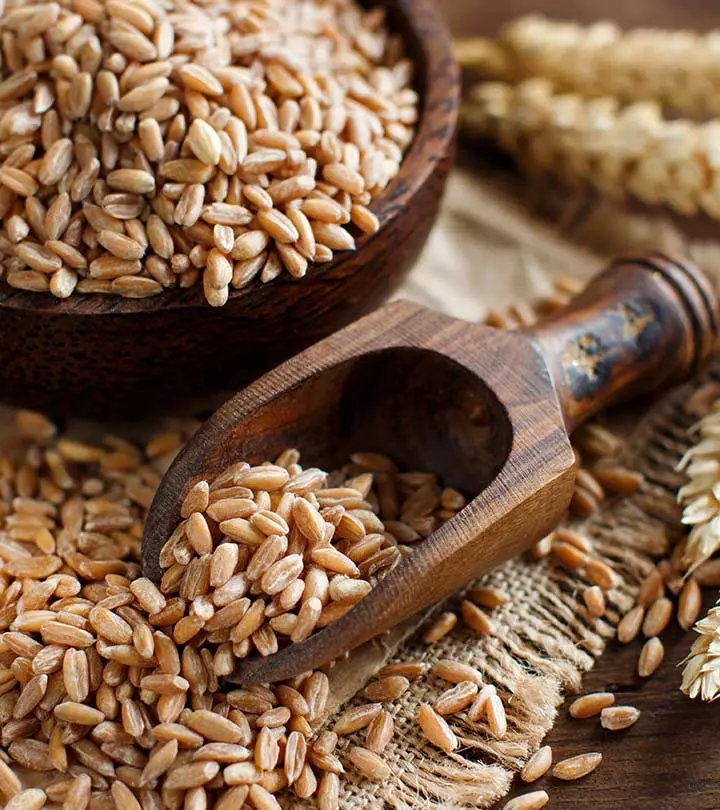
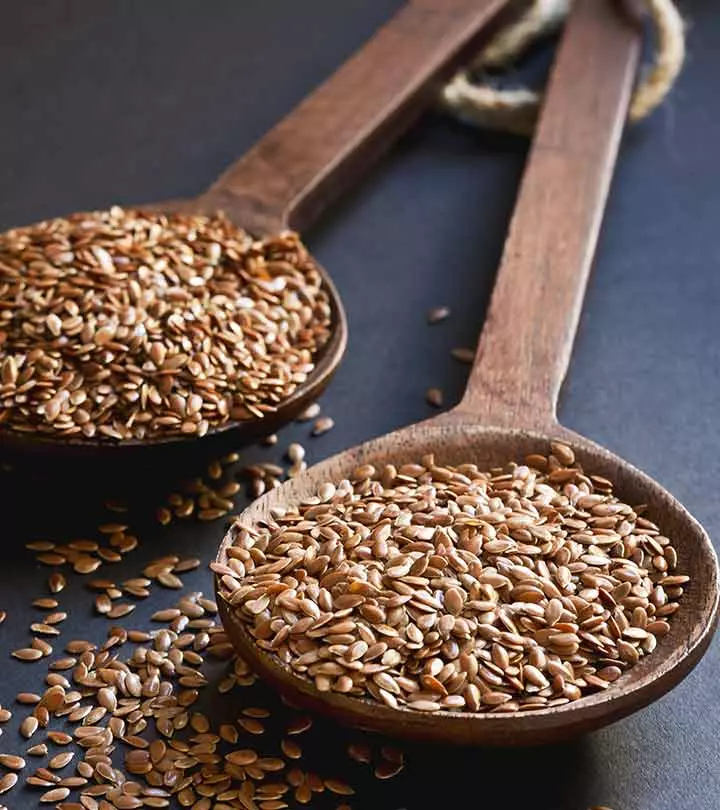





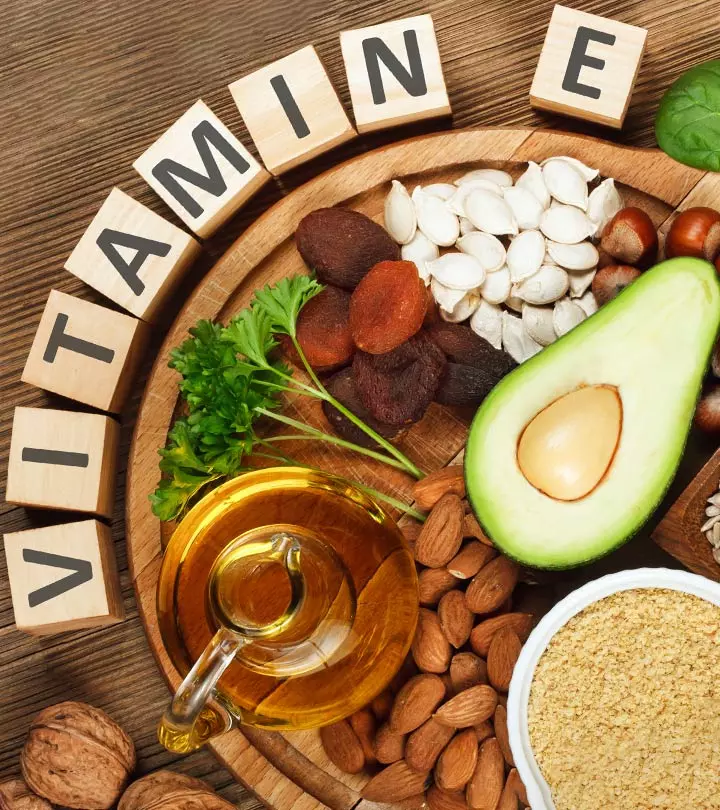








Community Experiences
Join the conversation and become a part of our empowering community! Share your stories, experiences, and insights to connect with other beauty, lifestyle, and health enthusiasts.